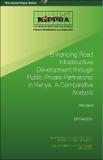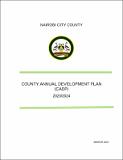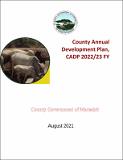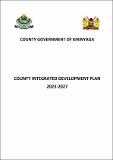| dc.date.accessioned | 2020-11-25T05:46:28Z | |
| dc.date.available | 2020-11-25T05:46:28Z | |
| dc.date.issued | 2015 | |
| dc.identifier.uri | http://repository.kippra.or.ke/handle/123456789/2236 | |
| dc.description.abstract | Infrastructure development offers the main platform for attainment of the development objectives envisioned in Kenya’s Vision 2030. Bridging Kenya’s infrastructure finance gap, which is estimated at US$ 2.1 billion (approximately Ksh 178.5 billion) annually by the 2013 Africa Infrastructure Country Diagnostic Report, is a major policy concern. In the roads sub-sector, only 6.95 per cent of the road network was reported to have been paved by 2013, yet road infrastructure accounts for over 80 per cent of total passenger traffic and 76 per cent of the freight within the country. In view of the limited state resources and need to control the public debt burden resulting from increased government borrowing to finance infrastructure development in the country, the government is currently focusing on bringing on board private sector investors to help bridge the road infrastructure gap. However, the roads sub-sector is yet to receive any meaningful boost from Public Private Partnership (PPP) initiatives in Kenya. This prompted this study to examine the private sector’s assessment of the financial viability of PPP road infrastructure projects in the country and carry out a comparative study on selected countries that have successfully implemented the PPP scheme in financing road infrastructure development. The study results indicate that a complete PPP road infrastructure project of Thika Highway magnitude is financially unviable to the private party if they are left to solely finance the whole project. The study found that for a project of Thika Highway magnitude to be financially viable, then the private party would need financial support on at least 60 per cent of the capital cost of the project. This affirms the need for government financial support to improve the viability of PPP road infrastructure projects in the country. The study also identifies areas in the PPP framework, specific to the roads sub-sector, that need improvement. The study finally provides recommendations on measures that should be taken to improve on these areas in order to enhance road infrastructure development through Public Private Partnership initiatives in the country. | en |
| dc.language.iso | en | en |
| dc.publisher | The Kenya Institute for Public Policy Research and Analysis (KIPPRA) | en |
| dc.relation.ispartofseries | DP/184/2015; | |
| dc.subject | Road Infrastructure | en |
| dc.subject | Road Networks | en |
| dc.subject | Public Private Partnership | en |
| dc.subject | Kenya Vision 2030 | en |
| dc.subject | Public Private Partnerships | en |
| dc.title | Discussion Paper No. 184 of 2015 on Enhancing Road Infrastructure Development through Public Private Partnership in Kenya: A Comparative Analysis | en |
| dc.type | KIPPRA Publications | en |
| ppr.contributor.author | Oguso, Alex | |




